

Parenting Styles and Child Behavior — Psychology In Action. More extensive research is critical to enhancing the field’s current understanding of parenting styles and the role they play in child behavioral outcomes.
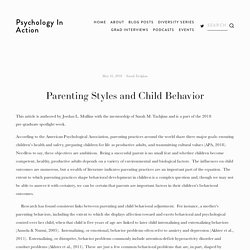
An increased understanding of the roots of different parenting practices, may enable the field to more effectively address the environmental factors that lead parents to adopt less ideal strategies. This research should be used to guide the development of more effective prevention and intervention programs aimed at fostering adaptive behavioral development in children.
Because parenting programs have been found to demonstrate a large and sustained effect on early disruptive behavior problems (Comer et al., 2013), it is important to ensure these programs are widely available to at-risk families, and that these families are aware of their availability. Jordan L. Mullins graduated from the University of California, Davis, in 2017 with a B.A. in Psychology and a double minor in Spanish and Human Development. References Calzada, E. What Is My Parenting Style? Four Types of Parenting. One of the interesting things about being a parent is that there is great variation in how we raise our children.
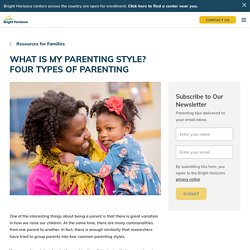
At the same time, there are many commonalities from one parent to another. 4 Types of Parenting Styles and Their Effects on Kids. Your parenting style can affect everything from how much your child weighs to how she feels about herself. It's important to ensure your parenting style is supporting healthy growth and development because the way you interact with your child and how you discipline her will influence her for the rest of her life. Researchers have identified four types of parenting styles:1 AuthoritarianAuthoritativePermissiveUninvolved Each style takes a different approach to raising children and can be identified by a number of different characteristics.
Authoritarian Parenting Do any of these statements sound like you? You believe kids should be seen and not heard.When it comes to rules, you believe it's "my way or the highway. " If any of those ring true, you might be an authoritarian parent. Authoritarian parents are famous for saying, "Because I said so," when a child questions the reasons behind a rule. They also don't allow kids to get involved in problem-solving challenges or obstacles. Why Parenting Styles Matter When Raising Children. Developmental psychologists have long been interested in how parents affect child development.
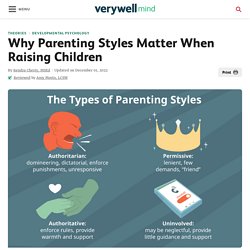
However, finding actual cause-and-effect links between specific actions of parents and later behavior of children is very difficult. Some children raised in dramatically different environments can later grow up to have remarkably similar personalities. Conversely, children who share a home and are raised in the same environment can grow up to have very different personalities.
The Definition of Authoritarian Parenting. Authoritarian parenting is a parenting style characterized by high demands and low responsiveness.
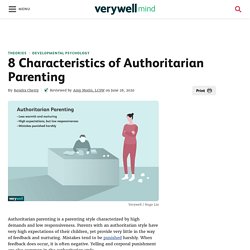
Parents with an authoritarian style have very high expectations of their children, yet provide very little in the way of feedback and nurturing. Mistakes tend to be punished harshly. When feedback does occur, it is often negative. The authoritarian parenting style: What does it look like? © 2010-2018 Gwen Dewar, Ph.D., all rights reserved The authoritarian parenting style: Little nurturing, lots of psychological control You might have a good handle on what it means to favor authoritarian government: The blind submission to authority.

The stifling of autonomous, critical thinking. Authoritarian parenting: What happens to the kids? Photo by CEphoto, Uwe Aranas © 2010-2017 Gwen Dewar, Ph.D., all rights reserved The authoritarian parenting style is about being strict and stern.

It insists on unquestioning obedience, and enforces good behavior through threats, shaming, and other punishments. As defined by psychologists, it's also a style associated with less parental warmth and responsiveness (Baumrind 1991). That doesn't bode well for a child's health outcomes, especially if she's growing up in an otherwise stressful environment. But what about other things -- like behavior problems? If authoritarian parents are demanding, doesn't that at least suggest they'd produce kids who are better-behaved and more successful in the classroom?
Surprisingly, the evidence indicates otherwise. Authoritarian Parents - Video Example. Summary. What Is Authoritative Parenting? The authoritative parenting style: An evidence-based guide. © 2010 - 2017 Gwen Dewar, Ph.D., all rights reserved What is authoritative parenting?

The authoritative parenting style is an approach to child-rearing that combines warmth, sensitivity, and the setting of limits. Parents use positive reinforcement and reasoning to guide children. They avoid resorting to threats or punishments. This approach is common in educated, middle class families, and linked with superior child outcomes throughout the world.
Kids raised by authoritative parents are more likely to become independent, self-reliant, socially accepted, academically successful, and well-behaved. 12 Ways to Become a More Authoritative Parent. There isn’t a single formula for raising children well.
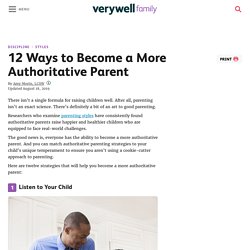
After all, parenting isn’t an exact science. There’s definitely a bit of an art to good parenting. Researchers who examine parenting styles have consistently found authoritative parents raise happier and healthier children who are equipped to face real-world challenges. The good news is, everyone has the ability to become a more authoritative parent. And you can match authoritative parenting strategies to your child’s unique temperament to ensure you aren’t using a cookie-cutter approach to parenting. Here are twelve strategies that will help you become a more authoritative parent: Validate Your Child’s Emotions Authoritative parents acknowledge their children’s feelings.
So the next time your child is upset, resist minimizing your child’s feelings by saying, “It’s no big deal,” or “Stop crying. Authoritative Parents - Video Example. Summary. What Is Permissive Parenting? Permissive parenting is a type of parenting style characterized by low demands with high responsiveness.
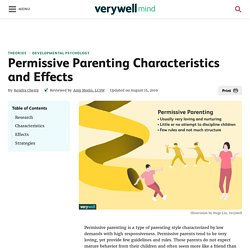
Permissive parents tend to be very loving, yet provide few guidelines and rules. These parents do not expect mature behavior from their children and often seem more like a friend than a parental figure. These parents tend to be the polar opposite of the so-called "helicopter parents. " Instead of hovering over their children's every move, permissive parents are incredibly lax and rarely make or enforce any type of rules or structure. Their motto is often simply that "kids will be kids. " Because there are few rules, expectations, and demands, children raised by permissive parents tend to struggle with self-regulation and self-control. Permissive parenting: A guide for the science-minded parent. © 2010-19 Gwen Dewar, Ph.D., all rights reserved Permissive parenting seems to be the "no discipline" approach to discipline.

Does it damage kids? Threaten to destroy civilization? The research suggests that permissiveness isn't the best approach to parenting--at least not in places like the United States. But much as we might get annoyed by parents who let their kids disrupt other people's lives, it's not clear that everyone labeled as "permissive" is doing their children--or their neighbors--a disservice. As you might expect, it depends on how you define "permissive. " Being warm and emotionally responsive to children doesn't make you "permissive," and it certainly doesn't make you a bad parent. On the contrary, studies link sensitive, responsive parenting with secure attachments and fewer behavior problems.
The official, psychological definition of permissiveness concerns parental control. Permissive Parenting: Its Characteristics And Effect On Children. Image: Shutterstock Daniel’s parents were highly affectionate to him. He was allowed to sleep late and wake up whenever he wanted. He was allowed to play loud music even if it disturbed the neighbors.
He had his way almost all the time. Permissive Parents - Video Example. Summary. Characteristics and Effects of Uninvolved Parenting. Uninvolved parenting, sometimes referred to as neglectful parenting, is a style characterized by a lack of responsiveness to a child's needs. Uninvolved parents make few to no demands of their children and they are often indifferent, dismissive, or even completely neglectful. The Major Parenting Styles During the 1960s, psychologist Diana Baumrind described three different parenting styles based on her research with preschool-age children: authoritarian, authoritative, and permissive parenting. In later years, researchers added a fourth style known as uninvolved parenting.
So what does the uninvolved parenting style look like at a glance? Some uninvolved parents may be relatively hands-off with their kids, but may still have some basic limits such as curfews. Uninvolved Parenting Style - Traits And Effects on Children. Uninvolved or neglectful parenting is a considerably new parenting style that does away with hand-holding and guiding the children.
It lets them learn by themselves. Parents could be uninvolved in varying degrees. While most parents look after the basic needs such as food and shelter for their kids, some others neglect their children completely. The Risks Of Having An Uninvolved Parenting Style. Updated July 13, 2019 Do you know what type of parenting style you have, or what type your parents had? Knowing what parenting style(s) a child was raised with can tell you a lot about their behavior as they age, and even when they start raising their kids. Parenting style can affect many things, like a kid's self-esteem, behavior, and even their mental health. Uninvolved Parents - Video Example. Summary.